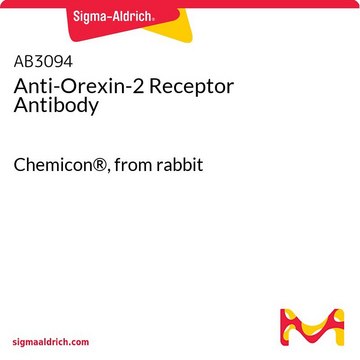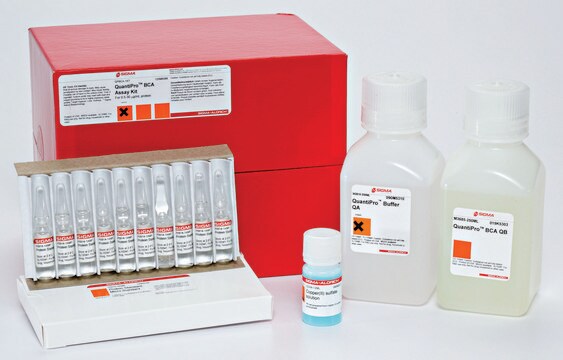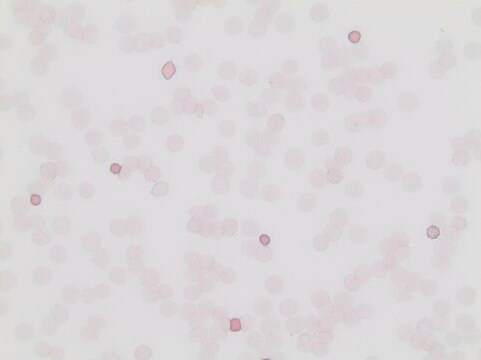MAK095
Aspartate Assay Kit
sufficient for 100 colorimetric or fluorometric tests
Sign Into View Organizational & Contract Pricing
All Photos(3)
About This Item
UNSPSC Code:
12161503
NACRES:
NA.84
Recommended Products
usage
sufficient for 100 colorimetric or fluorometric tests
detection method
colorimetric
fluorometric
relevant disease(s)
endocrinological disorders, diabetes; neurological disorders
storage temp.
−20°C
General description
Aspartate, the carboxylate anion of aspartic acid, is an acidic, non-essential amino acid involved in protein synthesis and multiple other cellular biochemical pathways. Aspartate contributes to nucleotide synthesis via the synthesis of the precursor inosine mono-phosphate. In the urea cycle, aspartate is a key metabolite, donating a nitrogen group towards the formation of urea. Aspartate is also critical for oxidative phosphorylation as part of the aspartate-malate shuttle, which transfers reducing equivalents across the mitochondrial membrane.
Application
Aspartate Assay Kit has been used to measure the aspartate levels in nerve cells and Lactococcus lactis strain cultured in lysogeny broth (LB) medium.
Suitability
The Aspartate Assay Kit is suitable for aspartate detection in cell and tissue culture supernatants, urine, plasma, serum, and other biological samples.
Principle
Aspartate concentration is determined by a coupled enzyme assay, which results in a colorimetric (570 nm)/ fluorometric (λex = 535/λem = 587 nm) product, proportional to the aspartate present. Typical detection ranges for this kit are 2-10 nmole (colorimetric) and 0.2-1 nmole (fluorometric).
replaced by
Product No.
Description
Pricing
Storage Class Code
10 - Combustible liquids
WGK
WGK 3
Flash Point(F)
188.6 °F - closed cup
Flash Point(C)
87 °C - closed cup
Choose from one of the most recent versions:
Certificates of Analysis (COA)
Lot/Batch Number
Don't see the Right Version?
If you require a particular version, you can look up a specific certificate by the Lot or Batch number.
Already Own This Product?
Find documentation for the products that you have recently purchased in the Document Library.
Influence of ketamine on amino acid neurotransmitters secretion by nerve cells in vitro.
Shi M, et al.
Bangladesh Journal of Pharmacology, 11(S1), 55-60 (2016)
The Impact of Inflammation on Pancreatic β-Cell Metabolism, Function and Failure in T1DM and T2DM: Commonalities and Differences.
Newsholme P, et al.
Type 1 Diabetes, 125-165 (2013)
Essentials of medical biochemistry: with clinical cases.
Ha C E and Bhagavan N V
ESSENTIALS OF MEDICINAL CHEMISTRY, 2011 null
Role of the Malate-Aspartate Shuttle on the Metabolic Response to Myocardial Ischemia
Ming Lu, et al.
Journal of Theoretical Biology, 254(2), 466-475 (2008)
Philip H Choi et al.
Proceedings of the National Academy of Sciences of the United States of America, 114(35), E7226-E7235 (2017-08-16)
Cyclic di-3',5'-adenosine monophosphate (c-di-AMP) is a broadly conserved bacterial second messenger that has been implicated in a wide range of cellular processes. Our earlier studies showed that c-di-AMP regulates central metabolism in Listeria monocytogenes by inhibiting its pyruvate carboxylase (LmPC)
Our team of scientists has experience in all areas of research including Life Science, Material Science, Chemical Synthesis, Chromatography, Analytical and many others.
Contact Technical Service




